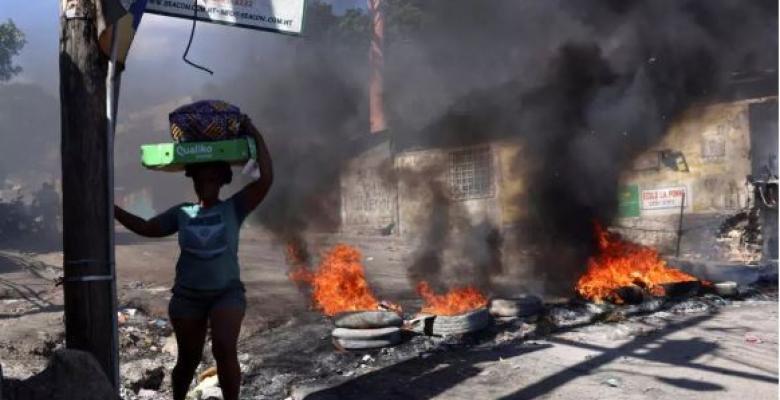Haiti: No Way Out
especiales

There’s no solution in sight to the serious problem afflicting Haiti, with social tensions, persistent and increasing gang violence, and political instability.
Haiti, a land of contrasts and paradoxes, is grappling with decades of political instability and widespread corruption. The resurgence of gang violence, which controls much of the capital, Port-au-Prince, and other parts of the country, demonstrates the urgency of restoring security and implementing profound reforms to pull the country out of the spiral of violence.
The mission of the Presidential Transitional Council, whose objective is to organize free and transparent elections, has been a disappointment due to its failure to overcome significant obstacles. The need to restore the Haitian people's confidence in their institutions and guarantee a democratic and fair electoral process is crucial for the future.
The precarious humanitarian situation requires immediate measures to meet the urgent needs of the population. Haiti's future depends on its leaders' ability to overcome political divisions and work together for a better future, but so far, nothing is encouraging.
Shaken by violence, Haiti is sinking deeper into chaos. Thousands of people have been forced to flee Port-au-Prince for the provinces, becoming refugees in their own country. The state has long since lost its monopoly on violence, and gangs dominate public spaces, especially in the capital and its metropolitan area, where they control more than 80% of the territory.
According to the United Nations Integrated Office in Haiti (Binuh), between January 1 and March 31, 2025, at least 1,617 people were killed and 580 injured in acts of violence.
The Binuh report states that at least 802 people died during security force operations, 65 cases of summary executions were recorded, allegedly at the hands of police officers, and 333 survivors of sexual violence were identified. From October 1, 2024, to March 31, 2025, an average of 18 violent deaths occurred per day.
The country has been experiencing a multidimensional crisis for years. The brutal violence that has spread, mainly in the capital, is compounded by widespread political corruption. In fact, if the November elections finally take place, they will be Haiti's first in nearly a decade.
Furthermore, this is a country with very few police officers to fight organized crime and gangs. It has nearly 12 million inhabitants but only about 13,000 officers, despite recruitment efforts by authorities.
It’s estimated that there could be more than half a million weapons of war in the hands of gangs, a flow of weapons and ammunition that comes mainly from the US state of Florida, which demonstrates the hypocrisy of the so-called efforts. The peace talks in this regard by the previous and current US administrations.
At the same time, the humanitarian situation in Haiti is alarming, with hundreds of thousands of people forced to flee their homes due to gang violence and precarious living conditions. Hunger and malnutrition levels continue to worsen, putting the health and safety of the most vulnerable populations at risk.
Faced with these colossal challenges, it’s imperative that the Haitian authorities, the international community, and civil society join forces to respond to the urgent needs of the population, strengthen the rule of law, and promote a culture of respect for human rights. But so far, this has remained mere words, not facts.
INEFFECTIVE VISITORS
Through efforts by the previous US administration, in addition to weapons and money, the first Kenyan troops from the Multinational Security Support Mission (MSS) arrived in Haiti, led by the African country to try to curb the violence unleashed by gangs. They arrived a year ago, but the record numbers of murders, injuries, and kidnappings continue, demonstrating that foreign interventions are not yielding good results in Haiti.
Although attempts were made to make it appear that this landing was the work of the weak Haitian authorities and a complacent Kenya, the United States' financial contribution and its interest in returning Haitian exiles played a significant role, something that is now even more urgent for Trump's racist policies.
Kenya offered to lead the multinational force to confront the wave of violence in Haiti. Since the first troops landed, not even half of the total of 2,500 promised have arrived.
Kenyan troops were expected to deploy their experience in riot management and peacekeeping operations on the ground. In addition, other countries joined this force, such as Benin, Bangladesh, and even Chad, in addition to logistical and financial support from the United States, which pledged more than $300 million for the mission and an additional $60 million for logistical assistance.
At the same time, human rights organizations have expressed concern about Kenya's history of police brutality, which resulted in the deaths of 60 people in 2024 due to the excessive use of force in suppressing protests against government initiatives.
These organizations fear that a culture of police repression is being exported to Haiti, which could further exacerbate the serious crisis the nation has been experiencing since the spiral of violence worsened following the assassination of Jovenel Moïse in July 2021.
The Kenyan police, which arrived in the Caribbean country on June 25, 2024, have had to deal with the distrust they arouse in a country that has witnessed half a dozen similar UN operations since the early 1990s.
Most of them have been marred by various types of scandals, mainly related to the excessive use of violence, the spread of disease, and systematic sexual abuse.
Amid the uncertainty, the proposal for a large military deployment remains lingering. In fact, Benin has pledged to provide an additional 2,000 troops, which would make the African country the largest single force in the mission (and the only French-speaking country, Haiti's official language). Despite this, none of these uniformed personnel have arrived in the Caribbean nation, amid a crisis with no apparent solution.
Translated by Amilkal Labañino / CubaSi Translation Staff













Add new comment